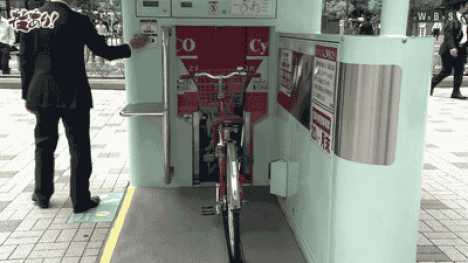Invisible Bicycles: Tokyo’s High-Tech Underground Bike Parking
In Tokyo, 14% of commuting traffic is on bike, according to the Japanese Transport Ministry.
But you’d never guess it.
That’s because the Japanese capital is burying thousands of bikes in underground parking vaults, in a bid to keep its sidewalks tidy.
From street level, an Eco Cycle looks like a small kiosk –a 560-square-foot hub with a door that seemingly leads to nowhere.

Sufficiently advanced science has been said to look like magic, like this subterranean cycle storage system – except in this case images and videos give you a peak at the secret workings below the surface.
On the space-starved streets of Tokyo, every bit of spare square footage counts, making the city’s investment in this complex-seeming solution a sensible way to tackle bike storage and theft.
Users simply walk their bike up, input a card or code, and let the machinery do the rest. The bikes are then taken underground, sorted and stored in a cylindrical shaft until needed, then available at a moment’s notice – bikers can be back on their rides faster than a valet at a fancy hotel could bring a car around.
The Eco Cycle Anti-Seismic Underground Bicycle Park was designed and built by the engineers of Giken Seisakusho and can store up to 800 bicycles at a time. Its creators have also developed similar system designs that would work the same way but with cars – while these have yet to be deployed, they promise even more thorough and efficient use of otherwise-wasted underground space. Imagine a (near) future in which we rarely go underground yet all of our vehicles are stored there, just waiting to wind their ways automatically back up to us on demand.
The real wonder is not that it already exists in Japan, however, but that it has not been imported to other countries. There could be issues with water tables in certain cities, but the solution could also potentially be adapted to spaces like abandoned subway stations that already exist in others.
Storage solution
78% of households own a bike, compared with 50% of those in Britain, according to a 2014 study by the Pew Research Center.
“It’s a blessing and a curse,” says Chad Feyen, of The Cycling Embassy of Japan, which is devoted to promoting cycling and improving bike infrastructure.
“You have a lot of cyclists, but you also have a lot of bikes clustered around Metro stations. It can be dangerous, or at the very least take up space.”
Eco Cycle aims to encourage cycling, but free-up space on Tokyo’s crowded streets.
Japan’s crystal universe actually exists
“In Japan, there are many illegally parked bicycles in city centers,” says Tsunenobu Nozaki, manager of construction design and planning at Giken, the Japanese company which invented Eco Cycle.
“If a bicycle park is far away from the cyclists’ destination, no one will use it. ”
Gone in 8 seconds
Cyclists can store or retrieve a bike at an Eco Cycle station in just eight seconds.
These efficient subterranean parking lots also protect bikes from rain and theft, while the seismic-resistant shaft is designed to withstand earthquake tremors.
A man loads his bike at an Eco Cycle. Credit: Keith Tsuji/Getty Images AsiaPac/Getty Images
The first time a cyclist uses one of these facilities, a smart locator device — called an IC Tag — is fitted to the front of their bike, which correspondents to the smart card they are provided with.
Cyclists swipe their cards at a check-in booth to activate the loading mechanism. Their bike then disappears through a small entryway and is lowered into the compact storage system below.
An Eco Cycle parking space costs about $25 a month, compared with over$700 a month for car parking slot in Tokyo.
Subterranean success
Today, there are 50 Eco Cycle stations across Japan, with a global expansion in the works.
“We regularly receive inquiries from other cities,” says Nozaki. “(We plan to) license the design and manufacture of Eco Cycle so that local manufacturers can design and build units in their country.”
However, the design is not without its skeptics.
“I think (Eco-Cycle) is a great idea and the technology is fascinating.
source: cnn/dannychoo
